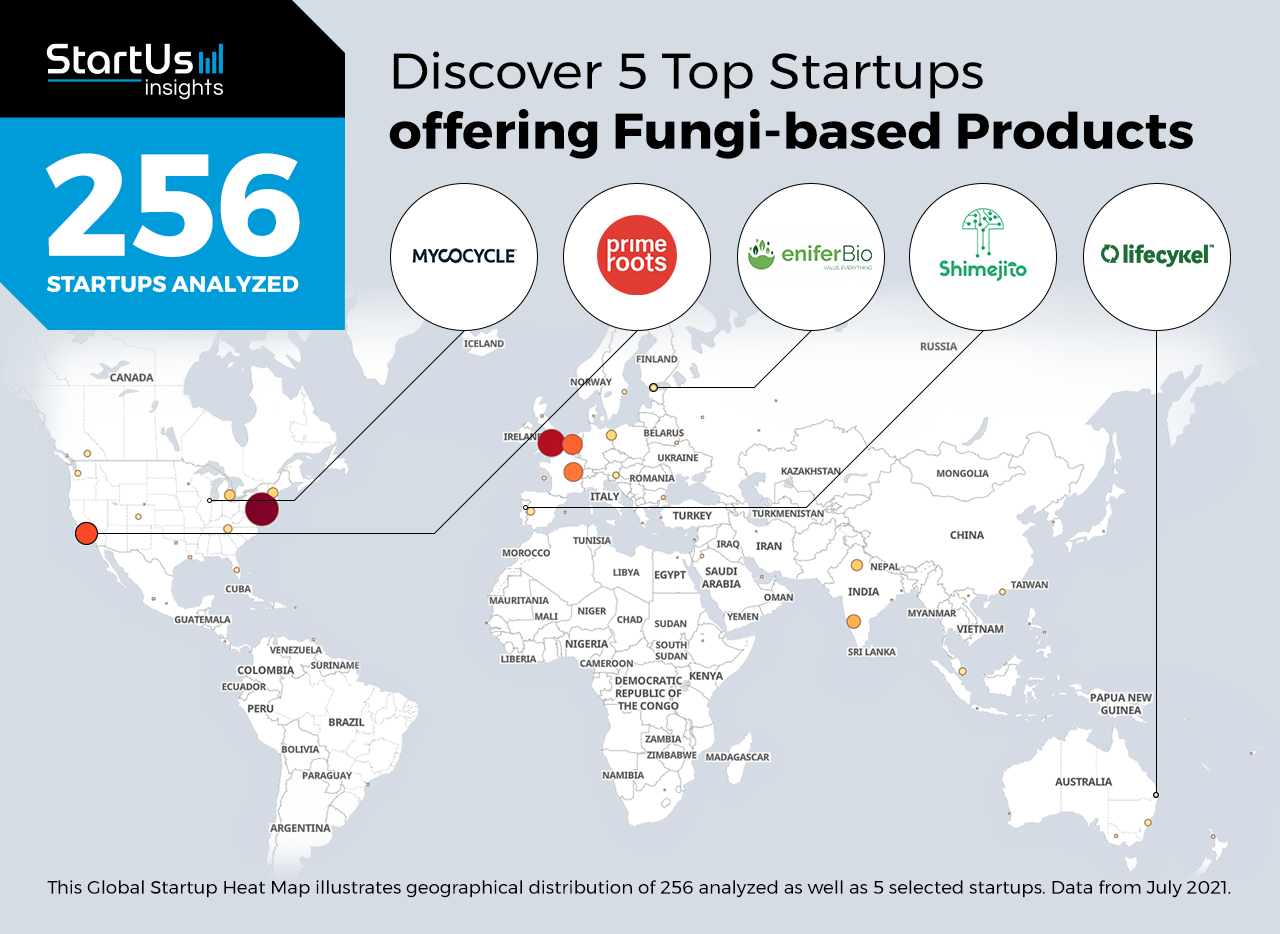Staying ahead of the technology curve means strengthening your competitive advantage. That is why we give you data-driven innovation insights into the circular economy industry. This time, you get to discover 5 hand-picked fungi-based products.
Global Startup Heat Map highlights 5 Top Startups offering Fungi-based Products out of 256
The insights of this data-driven analysis are derived from the Big Data & Artificial Intelligence-powered StartUs Insights Discovery Platform, covering 2.093.000+ startups & scaleups globally. The platform gives you an exhaustive overview of emerging technologies & relevant startups within a specific field in just a few clicks.
The Global Startup Heat Map below reveals the distribution of the 256 exemplary startups & scaleups we analyzed for this research. Further, it highlights 5 circular economy startups that we hand-picked based on criteria such as founding year, location, funding raised, and more. You get to explore the solutions of these 5 startups & scaleups in this report. For insights on the other 251 fungi-based products, get in touch.
Mycocycle provides Waste-to-Resource Solutions
Toxic constituents of plastics and petrochemicals are hard to treat as they don’t degrade easily. Mushrooms, however, do break down these complex carbons naturally. As a result, a lot of startups are applying mycology to eliminate toxins naturally. This is not only sustainable but the byproducts are also reusable and suitable for manufacturing new products, advancing the waste-to-resource paradigm.
US-based startup Mycocycle offers a mycelium-based waste-to-resource solution. The startup applies lab-cultivated fungi to shredded plastic and petrochemical waste streams. Moreover, the waste is processed on-site within the manufacturers, recyclers, or waste management companies’ infrastructure. Once remediated, it results in a fire and water-resistant renewable byproduct. It is then manufactured into new reusable products, thus allowing for a closed-loop process.
eniferBio produces Sustainable Aquaculture Feed
Traditionally, aquaculture feeds contain a high level of wild fish, which is not sustainable for ocean ecosystems. While soy is used as a replacement, it often results in reduced growth rates in fish due to its antinutritional proteins. Therefore, the aquaculture industry is shifting to more nutritional and sustainable plant-based alternatives. Startups offer fungi-based aquaculture feed acquired from fisheries’ side streams.
eniferBio is a Finnish startup that bioprocesses a sustainable aquaculture feed by converting dilute side streams from biorefineries. It uses a proprietary microfungus that rapidly consumes minute quantities of different organic compounds, making it easy to recover protein via filtration. PEKILO, the startup’s locally produced mycoprotein is an alternative for soy protein concentrate for use in aquaculture feeds. The product contains 65% crude protein and a balanced amino acid profile, equal to or better than that of soy. In addition, it contains up to 20% of beta-glucan, other fibers, and small amounts of minerals and fat.
Prime Roots provides Kōji-based Meat Alternatives
Meat production, especially beef, involves large amounts of water and resources and is highly unsustainable. Besides, the feedstocks are injected with hormones and antibiotics to increase cattle’s body weight. These adversely affect the consumers in the form of high cholesterol levels, which lead to further health complications. To tackle this issue, startups are offering alternative proteins, including fungi-based products, that use much less water, lower emissions, and confer health benefits.
Prime Roots uses Aspergillus oryzae, a filamentous fungus popularly known as kōji, to provide an alternative protein that mimics the taste and texture of seafood, beef, poultry, and pork. It also offers an umami flavor that is savory and enhances the taste of meat and cheese. The meat replacements are better than traditional meat as it contains no hormones and antibiotics, and are also cholesterol-free.
Shimejito Urban Farms makes Soil Additives
Chemical fertilizers have adverse effects on soil, including acidification and mineral depletion. Besides, it leads to oxygen depletion in waterways, emission of greenhouse gases, and chemical burns in crops. In response, startups are developing eco-friendly fertilizers from natural sources, including different fungi-based products, that are beneficial for plant growth and soil health.
Portuguese startup Shimejito Urban Farms utilizes mycorrhizal fungi to make soil additives that act as a replacement for chemical fertilizers and pesticides, and enhance the root system of plants. The startup develops two solutions for domestic cultivation — Viriato Plus Additive and Additive Viriato Premium. While the former is suitable for large plantations, the latter is apt for vegetable and small gardens. Shimejito also offers agriculture-as-a-service in the form of Shimejito Urban Farms. Companies grow up to 25 species of mushrooms in these farms, remotely monitor their business with IoT, and also receive sale and distribution guarantees.
Life Cykel grows Edible Mushrooms
Improper disposal of food and other waste from eateries often leads to contamination of soil and water bodies. However, this waste, which contains a good amount of nutrients, is capable of supporting mushroom cultivation. Mushrooms have a variety of applications, starting from the health benefits of consuming them to producing vegan leather. As a result, startups are growing mushrooms from waste. This not only saves space and the use of new resources for mushroom cultivation but also leads to effective waste management.
Life Cykel is an Australian startup that collects coffee waste from cafes and restaurants and utilizes them to grow edible mushrooms. It then processes the mushrooms to make various kinds of products like liquid extracts, powders, and drinks, among others. Thus, enabling a circular economy. Moreover, after using the coffee waste to grow mushrooms, it is further used as an organic fertilizer, which creates a closed-loop system.
Discover more Circular Economy Startups
Startups such as the examples highlighted in this report focus on food waste upcycling, algal products, and biomass feedstocks. While all of these technologies play a major role in advancing the circular economy, they only represent the tip of the iceberg. To explore more circular economy technologies, simply get in touch to let us look into your areas of interest. For a more general overview, you can download one of our free Industry Innovation Reports to save your time and improve strategic decision-making.










